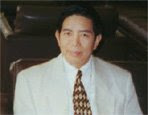Millennium Message
I am posting this message to celebrate the new Millennium - the Year 2000.
Once upon a time Lord Buddha was residing in the town of Sarvasti, at Jetavana monastery, donated by a very wealthy man called Anathapindika. Late that night a certain Deva, emitting exceedingly brilliant rays appeard before him . The rays of the Deva were so bright that the whole grove of Jetavana monastery was lit up. After paying respects to the Blessed Lord the Deva stood in an approriate place and asked for permission to ask some questions. Lord Buddha gave permission by remaining silent. The questions that the Deva asked and the answer that Lord Buddha gave came to be known as the "Thirty-eight auspices". In Myanmar, which is a Theravada country, they are known as the "Thirty-eight Mangalas".
Let me tell you a bit about how this story came about.
It was during the time when Lord Buddha was still alive. Now it came to pass that there were discussions and lectures held in towns and villages. On one occasion, a certain topic was put forward. "What is Mangala?". That was the question. Is Mingala something that is seen, or heard or perceived by the senses. Although the question was asked there was no one who could give a satisfactory answer. Many answers were proposed but these answers did not satisfy all the different sectors of the community. Thus a great debate ensued and as a result of this there was a great stirring among the guardian spirits. As time passed the debate spread from the guardian spirits to the upper realms of the Deva loka right up to the abode of the Brahma gods. It is said that this matter was even debated at the assembly of the devas. Nor did it stop there. It eventually spread to the whole world system. When it had spread to the whole world system, the great debate did not end. It spread from one world system to the next and it finally spread to all the ten thousand world systems. No matter how far this debate had spread there was no one who could provide a satisfactory answer to the question: "What is Mingala?".
One day this question was brought before Sakka, the King of Tavatimsa Deva loka. Sakkka knowing that Lord Buddha was the right person to ask instructed a deva to approach the Enlightened One to ask this question. This is how this story of the Thirty-eight Mingalas came about.
The Deva explained to the Enlightened One that many devas and men have been trying to get a satisfactory answer as to what constituted "Mangalas" or "Auspices". Then the Deva said "O Blessed One, what are the Mangalas, when practised and observed bring about welfare and happiness?"
The Blessed One answered in the following manner:
1.
To stay away from Fools,
To approach the Wise,
To honor those worthy of honor,
These indeed are Blessings.
6.
To pay respects to those worthy of respect,
To be humble and meek,
To be content with what you have,
To be grateful for what others have done for you,
To listen to the words of wise men,
These indeed are Blessings.
2.
To dwell in a suitable place,
To have done deeds good and pure,
To walk the path of righteousness,
These indeed are Blessings.
7.
To suffer adversity with fortitude,
To welcome the advice of wise men,
To see the samanas often,
To discuss the dhamma frequently,
These indeed are Blessings.
3.
To have wide knowledge and worldly skills,
To have discipline and good conduct,
To speak the truth in sweetness and grace,
These indeed are Blessings.
8.
To practise austerity,
To follow the path of righteousness,
To understand the Four Ariyan truths,
To realize Nibbana,
These indeed are Blessings.
4.
To perform acts of charity,
To practise and observe the ten laws of righteousness,
To help relatives and participate in community work,
These indeed are Blessings.
9.
When touched by pain and pleasure,
An arahat’s mind is unshaken,
‘Tis free from sorrow, pure and steadfast;
These indeed are Blessings.
5.
To steer clear of evil thoughts,
To refrain from evil words and deeds,
To stay away from intoxicants,
To be diligent in doing good deeds,
These indeed are Blessings.
10.
Those who have fulfilled these Blessings,
Are invincible everywhere,
Safe and happy anywhere;
These thirty-eight principles,
are indeed Blessings for devas and men.
Adapted by Kyaw Myaing from "A Guide to Mingala Sutta" by U Kyaw Htut. The original translation was done by Daw Mya Tin, Department for the Promotion of the Sasana, 1994, Union of Myanmar.
Saturday, July 4, 2009
Subscribe to:
Post Comments (Atom)


No comments:
Post a Comment